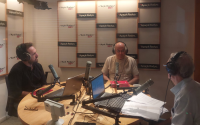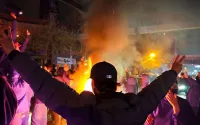The attacks of 9/11 on the Twin Towers and the Pentagon have been attributed to Osama bin Laden and Al-Qaeda, and have been called acts of terrorism. What is the meaning of terrorism? What is its purpose? Terrorism is usually defined as acts perpetrated against a category of victims with the objective of sowing terror, that is, excessive fear on the part of others in the category of the victims. It is done in the attempt to make these others change their future behavior. In this case, the victims were generically American civilians. (I know there were others in the buildings, but that was in some sense, from the point of view of the terrorists, accidental.) The first question, therefore, is, did the attacks succeed in sowing terror among Americans, and therefore changing their future behavior?
If one read The New York Times of Sept. 12, 2003, which no doubt neither Osama bin Laden nor George W. Bush did, one might be tempted to say that yes, indeed, the attacks succeeded because they changed the behavior of the kinds of people who were attacked, in ways that, for Osama bin Laden, were a victory. The United States used to boast of being an open society, where people could come and go as they pleased, a country welcoming of visitors and immigrants, a country in which the police were not oppressive, a country in which ordinary people were not afraid.
What do we find in the newspaper stories?
There is one story entitled "Security around U.S. embassy strains relations with Berlin." The Reuters story begins: "The tight security that has sealed the American Embassy here from the rest of Berlin and brought a once bustling block in the heart of the German capital to a standstill has an eerie cold war feel to it. Fences 10 feet high, huge concrete barriers, guards with machine guns and armored vehicles have made the street in front of the five-story building look like a war zone, disrupting businesses and motorists." The story explains the great unhappiness of Berliners, the disputes with the city government about the extent of the cordon around the embassy, and the fact that neither the British nor the French embassies have felt the need to install similar security measures. The story ends by quoting a Dutch tourist: "I don't know if there needs to be so much security here. It seems like way too much. It makes you feel like you aren't free."
The second story is entitled "In-transit foreign fliers deterred by new rules." This story details the consequences of the fact that the U.S. government now requires many persons from other countries who merely change planes in a U.S. airport to obtain visas in advance, even if these persons do not go beyond the transit lounge. Who are such people? Well, Brazilians flying to Japan passing through New York, or Costa Ricans flying to Spain passing through Miami. It also talks about Central Europeans coming on tourist visits to the United States - the excessive costs and time of acquiring the tourist visa in Slovakia, the fact that Czechs are in a dilemma in answering the queries about military service of the U.S. consuls because it seems Czech law makes it a crime to disclose military service. One result has been that a Czech tourist agency has decided to send people to Canada instead - not only no visa hassle, but the Canadian government actually offers to help with trip planning.
The third story is entitled "Aid workers leaving Iraq, fearing they are targets." At the very moment that the U.S. government is asking the world to assist it in the reconstruction of Iraq, "the great majority of foreign aid workers in Iraq, fearing they have become targets of the new violence, have quietly pulled out of the country in the past month, leaving essential relief work to their Iraqi colleagues and slowing the reconstruction effort." This is because the aid workers either are Americans, are mistaken for Americans, or are associated in Iraqi minds with the U.S. occupying authority. So, even if they are French, they have to fear that they are mistaken for Americans.
None of the three stories relates an issue of world-shaking importance. But the three together, two years after the attacks of September 11, indicate that the situation is far from being in hand from the point of view of the United States. The U.S. has had to retreat behind walls of safety - concrete barriers around its embassy in Berlin, creating obstacles to foreign tourism, and in Baghdad both losing civilian aid workers and putting its own people behind other concrete barriers. No doubt some, perhaps even all, of these security measures are justified by the dangers posed. But that's just the point. That was what Osama bin Laden hoped and expected would happen.
It is a victory for him because living behind concrete barriers is first of all a severe limitation on the freedoms of those who have to do this. And secondly, living behind walls breeds an ambiance of fear and besiegement, which inevitably affects behavior at home and abroad. I suppose if one presents this analysis to officials of the Bush administration, they will answer that the "war on terror" is supposed to end this state of fear and besiegement, by eliminating the source of the fear. One has the right to wonder, after reading the newspaper accounts, whether this "war on terrorism" has been very effective, whether the Bush administration has in fact done what it would actually take to eliminate the source of the fear. The fact is that, at the present time, the fear is growing, not diminishing. It behooves us to ask why.






